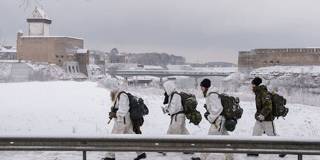Since Russia’s annexation of Crimea in early 2014, its political and military relations with the West have deteriorated sharply. To head off the risk of an arms race or military confrontation, both sides must urgently agree to reciprocal measures to limit military capabilities and engage in arms control, beginning in the Baltics.
BERLIN – Since Russia’s annexation of Crimea in early 2014, its political and military relations with the West have deteriorated sharply. Russian military redeployments, exercises, and threats have increased insecurity across Europe. NATO has responded by increasing its military presence in Central Europe, fueling fears of encirclement in the Kremlin. To head off the risk of an arms race or military confrontation, both sides must urgently agree to reciprocal measures to limit military capabilities and engage in arms control.

BERLIN – Since Russia’s annexation of Crimea in early 2014, its political and military relations with the West have deteriorated sharply. Russian military redeployments, exercises, and threats have increased insecurity across Europe. NATO has responded by increasing its military presence in Central Europe, fueling fears of encirclement in the Kremlin. To head off the risk of an arms race or military confrontation, both sides must urgently agree to reciprocal measures to limit military capabilities and engage in arms control.